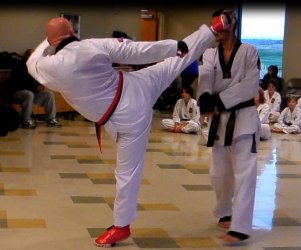Our Moo Duk Kwan school grades on a 1-10 scale. Categories are:
Poomsae, Self-Defense, Free Sparring (Offense, Defense, Combinations [multiple opponents at higher ranks]), Breaking, Knowledge, and Manner/Discipline/Behavior (which is graded by family as well as instructors).
Minimum of 6 in each category to pass. I've never seen anybody fail, because students are tested every class. They're not invited to participate in the formal exam unless they are already consistently performing at the higher level. If the candidate scores less than 6 in any category, their promotion is held until they are able to complete that section. I've seen this happen a few times. Mostly younger students who had difficulty with the breaks.
Testing is generally on Saturday. Results are sent to our Kwan Jang Nim who signs off on the certificates (for geup ranks or MDK Dan ranks). Belts and certificates are generally awarded about two weeks later. The certificate is read, the student is called forward and their rank is awarded.
There has only been two students promoted to Dan ranks (One Chodan, One Eedan) in the 2.5 years we've been at this school (we were at the tests, but were in Cancun diving when they were awarded), so I don't know exactly what the promotion "ceremony" is, but I suspect it's pretty much the same.
Dan testing is a bit more involved, but not much. Students are promoted to Cho Dan Bo and hold that rank for a MINIMUM of 6 months, until they are invited to test for Chodan. We had a Dan test in November. One candidate had been Cho Dan Bo for 2.5 years (he just turned 16, which is our minimum age) and I had been Cho Dan Bo for 6 months. Dan testing is longer, naturally. For Geup tests, students perform 1-2 forms. We performed Kichjo Il Jang, all 8 Poomsae Palgwae and Koryo. I was prepared to perform Taegeuk and Chang Hon forms as well, but at 50, I was quite happy to stop after 10.

At geup ranks, students have mandatory breaks based on their rank. Dan candidates choose thsie own breaks. The other candidate did a 4-station break with 1" straight punch, 2" skip side kick, 2" spinng hook kick and 2" standing side kick. His power break was 4" with a flying side kick. I did a 4-station break with 2" knee, 2" rear elbow, 2" standing side kick and 1" forehead. My power break was 5 16x8x2" concrete pavers. For sparring, we did free sparring against each other, free sparring against 3 opponents, one round vs a 2nd Dan during which we were defensive only (which was especially fun, since I tested with my left hand casted and held behind me) and one round with a 1st Dan during which we were to be as agressive as possible.
Scoring for Geup ranks is done by whichever black belts are there that day, supervised by Sabumnim. Cho Dan Bo are occassionally asked to help.
Scoring for our Dan test was a panel. A 1st and 2nd Dan who gave instruction, sparred with us, etc. And a 3rd and 4th Dan who did the actual scoring.
Two pictures. My power break, and one from the sparring. I'd pulled the guys hands down with a spinning hook and followed up with this roundhouse.

